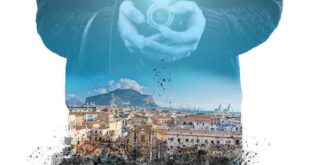There’s something about Italian films that gets under my skin. When I watch them, I always ride a rollercoaster of emotions ranging from nostalgia to sentimentality to anger to sadness to fear to joy to empathy. For more than a decade now, I look forward every year to the media screenings of the films selected for Lincoln Center’s annual Italian film series, Open Roads: New Italian Cinema. I anticipate the films bringing me into the worlds of their complex characters and the artists responsible for creating them. I look forward to this kind of cinematic escape, and every year, I make my pick for the must-see film of the series. This year, I watched four: Daniele Cipri’s “La buca” (Money Buddies), Cristina Comencini’s “Latin Lover”, Ivano De Matteo’s “I nostri ragazzi” (The Dinner) and Lamberto Sanfelice’s “Cloro” (Chlorine).
I was really enthused about seeing Cristina Comencini’s “Latin Lover” because of the predominately female cast. I imagined her actresses would create beautiful, complex women and would bring amazing performances to the table. After watching it, I can say the performances were indeed the highlight of the film. It was Virna Lisi’s last project and she was as beautiful and as graceful as ever, carrying each scene with the poise and elegance of a true class act.
The film explores the consequences of infidelity and how the offspring of multiple marriages and affairs have to deal with the voids, resentment and in this case, sisters from other mothers. I felt a lot of anger while I watched this film, anger towards the man that created all this drama, an arrogant, aloof, self-centered actor, portrayed perfectly by Sicilian born, Francesco Scianna. A few years ago, Maria Sole Tognazzi’s film, “L’uomo che ama” (The Man Who Loves) was presented at Open Roads. It showed infidelity through the eyes of a man whose fiancé was unfaithful. It was refreshing and unique to see this perspective. Roberto, played passionately by Pierfrancesco Favino, suffered, just as a woman suffers when she is the victim of infidelity, and there was really no joking, no sense of acceptance. However, as we see in “Latin Lover”, when the person doing the cheating is a man, there is a sense of entitlement and acceptance, and we see all the women, the wives and daughters sitting around making jokes, celebrating their love and adoration for him, even though they suffered and continue to suffer immensely. Even when one of the characters finds her husband in bed with her half-sister, his punishments- expressed in her snares and slapstick abuses were made to be funny. That element did anger me but the performances took my mind off it. Virna Lisi,Valeria Bruni Tedeschi and Angela Finocchiaro were such a joy to watch. The last scene of the film was deeply moving, and in my eyes, slightly redeemed Francesco Scianna’s self-absorbed male character, so my anger came full circle in the end. That, I can say, is the enchantment of Italian cinema.
Ivano De Matteo’s “I nostri ragazzi” was adapted from Herman Koch’s bestselling novel, “The Dinner”. The creative way in which De Matteo interprets this story is engaging and suspenseful. Without giving too many details away, the story is a reflection of today’s disconnect between parents and their teenagers. Kids are always seen engrossed in their phones watching videos, playing games and posting photos and updates to social media. I can imagine how difficult it is for parents to really know who their kids are meeting or what exactly they’re watching. This story takes that idea and exposes a parent’s worst nightmare. The film stars four of Italy’s most talented actors: Alessandro Gassman, Barbora Bobulova, Luigi Lo Cascio and Giovanna Mezzogiorno. Alessandro Gassman’s performance stood out for me. It was really his film, and I’m ok with that because it was a beautiful, soulful performance in which we saw a side of Gassman we rarely see, and for this, I applaud the director, Ivano De Matteo.
“Cloro” by Lamberto Sanfelice is ironically the film I’ve written most often about, as it was presented at other film festivals earlier this year, and ended up being the one in this group I most understood and for which I felt the most empathy. The story follows Jenny as she dreams of being a synchronized swimmer. After a parent passes away, she is forced to put her dream on hold to take care of business. That business seems never-ending as one problem leads to another. Time passes and she tries to hold on. But that time slowly distances her from the dream, and the inevitable day arrives when she realizes the life she once knew is a thing of the past. “Cloro” is Sanfelice’s first feature-length film and perhaps that is the reason for some inconsistent pacing. I felt like the story began slowly and ended quickly. For example, I think Jenny’s love interest should have entered the story a lot sooner. The two had a strange relationship but underneath the tension, really cared about each other. I would have liked to see their story develop more. Nevertheless, “Cloro” is a moving, heart-wrenching tale of one girl’s plight and how she struggles with being a teenager one day and caregiver the next.
That brings me to Daniele Cipri’s “La Buca”, which contains all the right elements for filmmaking magic. “La Buca” is a unique, atmospheric film with echoes of Orson Welles, especially his 1946 film noir, “The Stranger”. I have to wonder if Cipri saw that film and was influenced by it. “The Stranger”came to mind within moments of watching “La buca”.
Cipri created his own genre with “La Buca” by combining elements of comedy, classic cinema, adventurous music, retro props and funky cinematography accented with a palate of sepia and noir. Cipri paired up two of Italy’s most talented and versatile actors, Sergio Castellitto and Rocco Papaleo. Their strong chemistry is apparent right away and the two seem like a couple of old friends. Although they each fully embraced their zany characters, it’s safe to say that it’s Castellitto’s film. He stole the show and had a lot of fun doing so. Papaleo assumed a more laid back role and let Castellitto shine. Enter Valeria Bruni Tedeschi and you have one talented cast with magnificent chemistry. Castellitto is Oscar, a paranoid, unscrupulous defense lawyer staging accidents in order for his clients to receive full compensation. Papaleo is Armando, a down-on-his-luck ex-con who just served a 20-year prison sentence for a crime he didn’t commit, with ‘Internazionale’ the stray dog that won’t leave his side. Bruni Tedeschi is the sweet, caring barista who also serves up the occasional and much-needed voice of reason. The story follows the adventures of Armando who enlists the help of an ill-intended Oscar to search for justice and to clear his name. While “La buca” may not be the most reflective, thought-provoking film in the series, it is right up there with the most entertaining.
I enjoyed all these films for completely different reasons, but my 2015 Open Roads must-see is Daniele Cipri’s “La Buca”. So, get your tickets for Open Roads, which will be held June 4-11 and support Italian cinema in America!
For a complete list of films and showtimes, visit the Film Society of Linclon Center online- http://www.filmlinc.com/films/series/open-roads-new-italian-cinema-2015
 Fra Noi Embrace Your Inner Italian
Fra Noi Embrace Your Inner Italian






